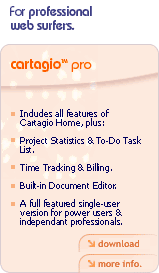Finding "ONFOLIO" and "CARTAGIO" Too Dissimilar, TTAB Grants 2(d) Summary Judgment
In my estimation, the Board grants summary judgment in Section 2(d) cases about one time out of ten: typically for the "plaintiff" when the marks and goods/services are essentially the same, or for the "defendant" when either the marks or the goods are just too different. As an example of the latter scenario, the Board granted summary judgment to defendant Onfolio, Inc. because the marks ONFOLIO and CARTAGIO (for computer software) are too different to support a likelihood of confusion claim. Missiontrek Ltd. v. Onfolio, Inc., 80 USPQ2d 1381 (TTAB 2005) [not citable].

Plaintiff Missiontrek sought to cancel Onfolio's registration for the word mark ONFOLIO, and opposed its application to register the mark shown above, for "computer software for capturing, organizing and sharing on-line content." Missiontrek alleged likelihood of confusion with the mark CARTAGIO, registered for various computer software products.
Onfolio moved for summary judgment, conceding for purposes of the motion that the goods are related, but asserting that the marks are completely distinct in sound, appearance, connotation, and commercial impression, and that "the dissimilarity of the marks so outweighs the other du Pont factors that it is dispositive."
Onfolio pointed out, inter alia, that the only common element in the marks is the suffix "IO," which is an ordinary suffix found in numerous registered marks for hardware and software. Moreover, the root of the mark ONFOLIO is the word "folio," meaning a "leaf of paper" or a book made of folded sheets, whereas CARTAGIO has no known meaning, other than "its being similar to the old Latin name of the city of Carthage, Tunisia."
The Board agreed with Onfolio that the first du Pont factor is dispositive, and that the absence of any genuine issue of material fact entitled Onfolio to summary judgment.

Missiontrek principally argued that its survey results showed actual confusion because "25% of the respondents indicated that the product names are so similar that it is likely that the products come from the same source." The Board, however, ruled that the survey failed to raise a genuine issue of material fact regarding the similarity of the marks.

The Board noted that the survey consisted of e-mails sent by Missiontrek's director to 42 people who had recently downloaded the CARTAGIO software. Responses were received from 8 persons, 2 of whom "indicated actual confusion and six indicated no confusion." Thus, according to Missiontrek, "a full 25% of those surveyed indicated confusion."
The Board was not impressed, pointing out that 2 respondents out of 42 inquiries "mathematically does not amount to the inflated percentage calculated by plaintiff (25%)."
"We observe, too, that the survey, at a minimum, is not based on established or recognized survey techniques; was prepared and administered by a biased party; and was not analyzed in any statistically meaningful way."
The Board therefore dismissed the opposition and denied the petition for cancellation.
Text Copyright John L. Welch 2005




0 Comments:
Post a Comment
<< Home